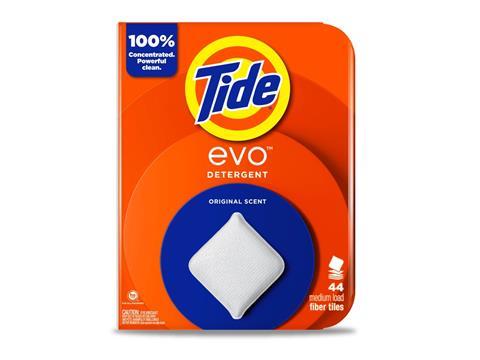
Tide is offering a fibre tile form for its laundry line in FSC-certified recyclable paper packaging – a move set to replace plastic bottles and lessen the environmental impact of washing cycles.
Revealed at SXSW 2024, Tide evo comes in response to consumer demand for a ‘lighter, faster and simpler’ wash. It utilizes ‘tens of thousands of minuscule fibres’ that instantly activate in water, forming six layers of concentrated cleaning ingredients without the addition of unnecessary liquids and fillers.
As well as claiming to offer five times more effective stain removal than the leading competitive brand bargain detergent, it aims to enhance convenience and lessen the environmental impact of laundry products. Designed for cold water washing, the tile is set to save up to 90% of energy compared to hot water cycles.
Additionally, the product negates the need for a conventional plastic bottle with its recyclable paper packaging. It will be available in Colorado from April 2024 and will expand across America throughout the year.
“Today marks a significant milestone for Tide, as we unveil Tide evo at SXSW 2024, marking a new phase of innovation in laundry care,” said Sundar Raman, chief executive officer at P&G Fabric & Home Care. “Tide evo embodies over a decade of research and development, signifying a major advancement in how we approach cleanliness and efficiency in our daily lives.”
Laundry detergents have increasingly embraced paper-based packaging in the last few years. Back in 2022, SUPA packaged its eco-mate brand in what claimed to be the world’s first plastic-free paper bottle for laundry and washing up liquids, aiming to cut down on single-use plastics.
The following year, Tesco implemented recyclable cardboard packaging for its laundry detergent pods, and Sainsbury’s unveiled home-recyclable cardboard cartons for its 750ml own-brand laundry detergents in a bid to save 22 tonnes of household plastic waste annually.
If you liked this story, you might also enjoy:
Report: The ultimate guide to global plastic sustainability regulation
The Brief: Oxo-(bio)degradables: the who, what, and why of breaking down fossil-based plastics
Sustainable Packaging Summit: How Kraft-Heinz uses collaboration to drive innovation
The Brief: Using ocean-bound plastic in packaging – how, why and should we?














No comments yet